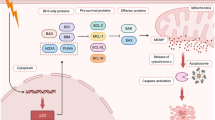Abstract
Defective apoptotic mechanisms are considered to play a role in both the development of malignancy and resistance to chemotherapeutic drugs. The Bcl-2 family of proteins regulate the cellular commitment to survive or die when challenged with various apoptotic stimuli. Purpose: The purpose of this study was to identify the point at which Bcl-2 interrupts the apoptotic cascade initiated following exposure of human tumor cells to etoposide. Methods: A stable Bcl-2-expressing HeLa-transfected clonal cell line, along with its control-vector-transfected counterpart, were utilized in this study. Following etoposide exposure, cells were examined for cell cycle arrest, formation of hyperdiploid cells, apoptotic DNA degradation, loss of plasma membrane integrity, levels of expression of members of the Bcl-2 protein family, caspase activation, degradation of poly(ADP-ribose) polymerase and movement of Bax from cytosol to cellular membrane fractions. Results: Caspase activation, poly(ADP-ribose) polymerase degradation and Bax membrane insertion were initiated rapidly following etoposide removal, concomitantly with cell cycle arrest. Whereas Bcl-2 had no effect on etoposide-induced cell arrest, it interrupted all aspects of apoptosis, including activation of caspases, poly(ADP-ribose) polymerase degradation, DNA fragmentation and loss of plasma membrane integrity. Surprisingly, Bcl-2 also blocked Bax membrane insertion. In addition, Bcl-2 also prevented the increase in cellular levels of Bak, Bax and Bcl-xL, along with degradation of actin and Bax. However, inhibition of etoposide-induced apoptosis by Bcl-2 resulted in the accumulation of giant, multinucleated cells that eventually lost the ability to exclude trypan blue without apoptotic morphology or DNA degradation. Conclusions: These results indicate that biochemical apoptotic processes are initiated concomitant with etoposide-induced cell cycle arrest and are interrupted by Bcl-2 overexpression. However, the aberrant mitotic events induced by etoposide are sufficient to kill these cells even in the absence of apoptosis.
Similar content being viewed by others
Author information
Authors and Affiliations
Additional information
Received: 1 September 1998 / Accepted: 3 November 1998
Rights and permissions
About this article
Cite this article
Elliott, M., Murphy, K., Stribinskiene, L. et al. Bcl-2 inhibits early apoptotic events and reveals post-mitotic multinucleation without affecting cell cycle arrest in human epithelial tumor cells exposed to etoposide. Cancer Chemother Pharmacol 44, 1–11 (1999). https://doi.org/10.1007/s002800050938
Issue Date:
DOI: https://doi.org/10.1007/s002800050938




